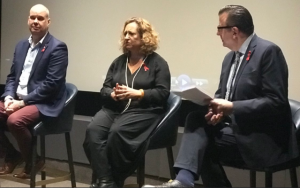THE LAST MILE: Richard hosts panel for World AIDS day at the Thompson Hotel.
 Richard hosted a screening of the short feature “The Last Mile,” a mini documentary highlighting progress made in the fight against HIV/AIDS since the 1993 release of the Oscar winning “Philadelphia.” Before the screening Richard spoke with Kim Snyder, director of “The Last Mile” featurette, Gary Lacasse, Executive Director Canadian Aids Society and Claudia Medina Toronto Fast Track Cities Spokesperson (not pictured).
Richard hosted a screening of the short feature “The Last Mile,” a mini documentary highlighting progress made in the fight against HIV/AIDS since the 1993 release of the Oscar winning “Philadelphia.” Before the screening Richard spoke with Kim Snyder, director of “The Last Mile” featurette, Gary Lacasse, Executive Director Canadian Aids Society and Claudia Medina Toronto Fast Track Cities Spokesperson (not pictured).
For more information click HERE! Here’s the text of Richard’s opening remark:
I’m a film critic but I wanted to take a moment provide some context before talking about Philadelphia and kicking of the panel. I first moved to what was then called Toronto’s Gay Village in the early 1980s. The neighbourhood was amazing, so alive. People crowded the streets, the restaurants, the bars and stores. It was a colourful place to live, and I still live there today.
A few years after I moved in, however, the neighbourhood changed. The bars and restaurant weren’t as full. Halloween on the street, which had always been a big deal, wasn’t as vibrant. AIDS had hit, spreading fear and uncertainty. Soon I was visiting friends in the hospital more often than meeting for drinks.
In The Last Mile they talk about Tom Hanks signing the screenwriter’s script, “My life will always have two parts, before and after Philadelphia.” Many of us who were there, who knew people who passed away at this time feel the same way about that period and now, on the eve of World AIDS Day, I am reminded of those days, of friends who were taken before we got the chance to grow old together.
Film and television were slow to react. The first film was a 1985 TV movie An Early Frost but it wasn’t until Philadelphia came along that the misinformation, misunderstanding, fear and stigma around HIV/AIDS was addressed on the big screen. 1993.
I remember seeing the film the weekend it came out. I left the theatre I knew I had just watched the first major film not just about AIDS but also the condemnation of intolerance. I thought of the families who could finally see their experiences dealing with their ailing loved ones reflected on screen in a loving and brave way. The film critic inside me noted the film’s style. Jonathan Demme shoots many of the speeches in intimate close-ups, forcing the audience to confront their feelings about a generation of made ill by AIDS. Emanuel Levy wrote that Philadelphia had the rare chance to “Change public opinion about an urgent problem.” Today as we celebrate the 25th anniversary of Philadelphia I think you’ll find the movie remains relevant today.
Last year, nearly 1 million people died from AIDS-related illnesses – that’s approximately two people every minute.
